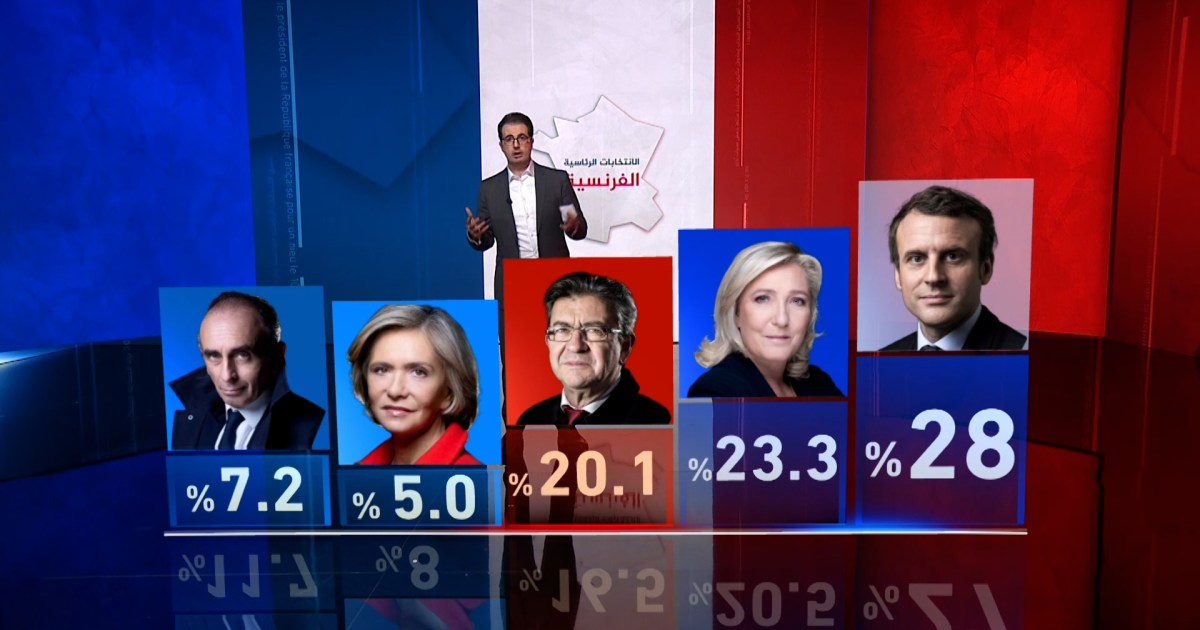PARIS
- Outgoing President Emmanuel Macron (28.5%) and the far-right National Rally candidate Marine Le Pen (23.6%) topped the results of the first round of the French presidential elections that took place on Sunday, and they moved to the second round of these elections scheduled for April 24.
The far-left candidate and head of the French Proud France party, Jean-Luc Melenchon, came in third place (21.1%), according to preliminary estimates by the Ipsos Institute.
The French voted yesterday in the first round of the presidential elections after electoral campaigns overshadowed by the Ukrainian crisis and regional issues, in which 12 candidates competed.
The turnout in the first round of these elections was 65% as of 3:00 p.m. GMT (5:00 Paris time).
According to figures issued by the Ministry of Interior on Sunday, these elections recorded a decline in the participation rate of 4.4 points compared to the 2017 elections (69.42%), and the 2012 elections by about (70.59 percent).
Cut off the road on the right
In an attempt by them to block the way on the extreme right, and to miss the opportunity to enter the Elysee for the first time through its candidate, Marine Le Pen, who reached for the second time after the 2017 elections, to the second round, the candidates of many unsuccessful parties called for the support of the candidate of the Center Party "Republic to Forward," outgoing President Emmanuel Macron.
After the results were announced, and they admitted defeat in front of their supporters, the right-wing Republicans, the Green Party, the Communist Party and the Socialist Party called for a vote for Macron.
France's proud candidate, Jean-Luc Melenchon, urged his supporters indirectly to give their votes to the outgoing president, when he stressed more than once, "Do not give a single vote to Marine Le Pen."
Like Melenchon, the anti-capitalist candidate Philip Bhutto (0.7%) declared that "the extreme right should not vote at all."
For his part, Communist Party candidate Fabian Russell, who received 2.6 percent of the vote, called for a vote for Macron in the second round in order to defeat the far right.
It's not resolved
In his brief speech to his supporters after the announcement of the preliminary results, Macron said that "nothing has been decided yet," and demanded an intensification of voting for him in the second round.
The outgoing president continued, "The debate that we will have for 15 days will be decisive for our country and Europe," and at the same time welcomed the "clarity regarding the extreme right" shown by several candidates calling for them to vote for it after their defeat in the first round.
Macron concluded his speech by stressing that this historic moment is decisive for the future of the nation, because nothing should be the same as before, adding, "I am ready to invent something new that combines different beliefs and sensitivities to build a joint action with them, in the service of the nation, in the coming years."
While Le Pen said at her campaign headquarters after the preliminary results were announced, "I want the next confrontation to be good so that the French people decide their fate," calling on everyone who did not vote for Macron in the first round to "join it" in the second round.
As for the head of the far-right "Restitution" party, Eric Zemmour (7.2%), he appealed to his voters to vote for Marine Le Pen.
Zemmour told his voters, "I have differences with Marine Le Pen. But there is a man in front of her who brought in two million immigrants and never mentioned the issue of identity. Therefore, I will not be deceived by my real opponent."
The far-right candidate, Nicolas Debonne, also called Inign, who received 2.3% of the vote, to vote for Marine Le Pen.
big slap
According to experts and observers of French affairs, some of the "major" French parties that have a history of such important electoral benefits received a heavy blow with the "weak and disappointing" results they achieved, such as the "Socialist" and "Republican" parties, which reached their lowest levels in the world. Launching in the presidential election.
Socialist candidate Anne Hidalgo received 2.1% of the vote in the first round, while right-wing candidate Valerie Pecresse got 5%, according to polling institutes estimate Sunday night.
Highest abstinence rate
A study by the "Ipsos" Center for trends in opinion about the elections said that the abstention rate in the first round amounted to 26.5% with polling stations closed, which is the highest percentage since the 2002 elections (28.4%).
In some poor and marginalized neighborhoods, or what is known as the Parisian suburbs, inhabited by a majority of immigrants and Arab Muslims, participation rates in the elections did not deviate from the rule of abstention from voting, as the voter turnout in Saint-Denis province reached 14.71%, at midday Paris time.
It is noteworthy that in the context of the Fifth Republic in France, the 1974 elections witnessed the largest participation rate, in which Valéry Giscard d'Estaing won over François Mitterrand, as 87.33% of those registered in the electoral rolls voted in the second round.
The first round of elections that recorded the highest participation rate was in 1965 with a rate of 84.75%. It was the first election by universal suffrage under Charles de Gaulle's presidency.

